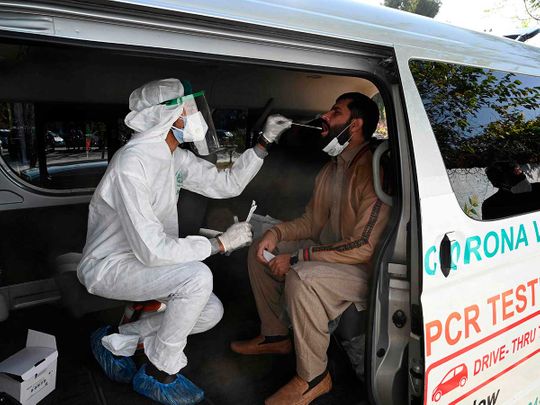
Islamabad: Pakistan’s single-day recoveries from COVID-19 have outnumbered infections and on Tuesday the country reported 3,606 recoveries from the deadly virus while the numbers of new cases recorded in the same period were 2,408.
According to the National Command & Operation Centre (NCOC) Pakistan’s total number of deaths after 41 fatalities in the last 24 hours stood at 10,717 while the tally of infections countrywide is reported 506,701.
The country had 40,088 tests in the last 24 hours that showed 34,007 active cases and 2,340 in critical condition.
COVID-19 vaccine likely by March
Federal Minister for Planning, Development and Special Initiatives Asad Umar at a news conference on Tuesday revealed that the government had booked 1.1 million doses of coronavirus vaccine which would most likely arrive by March.
Asad Umar said the government would purchase the COVID-19 vaccine from China. He further said Pakistan’s handling of the virus yielded good results.
A recently-conducted survey has also made public its findings according to which seven out of 10 people approved the Imran Khan government’s measures such as smart lockdown and curbs on shopping malls to check the spread of virus.
He gave credit to Prime Minister Imran Khan whose smart lockdown policy is acknowledged by the world, even the World Health Organisation has included Pakistan among the seven countries the world should learn from.
“Since the first day, the prime minister told us we have two responsibilities: to work to save the lives of the people and to save their jobs,” said the minister. However, he warned that several countries have seen the third wave of COVID-19 and appealed to the citizens to continue following standard operating procedures (SOPs) to contain the spread of the virus.
20 million people lost their jobs
Minister for Planning further said because of COVID-19, some 20 million people lost their jobs while 10 per cent livelihoods faced hunger for more than one day. Similarly, 30 per cent families faced insecurity as they had difficulty in purchasing basic items of daily use.
Asad Umar said people need to learn to live with the pandemic as it is far from over. The risk is very much there and we must follow the Standard Operating Procedures (SOPs) in letter and spirit.
He was of the view that the number of new cases, hospitalised patients, those on ventilators and deaths had started coming down after witnessing a peak in December 2020.
By the end of November 2020, the NCOC decided to close down some selected sectors again to prevent the spread of the deadly pandemic.
By the start of December, he said the hospitals across the country were receiving the highest number of patients but later on the trend started declining.
Similarly, he said in the second week of December, the number of those on oxygen was the highest and then in the third week COVID-19 patients on ventilators and deaths peaked.
After that the trend started easing and now it is on the downward trajectory.








